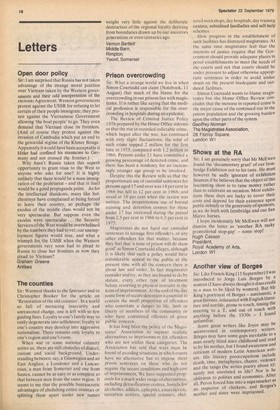Prison overcrowding
Sir: What a strange world we live in when Simon Courtauld can claim (Notebook, 11 August) that much of the blame for the overcrowding in our prisons lies with magistrates. It is rather like saying that the medical profession is responsible for the overCrowding in hospitals during an epidemic.
The Review of Criminal Justice Policy 1976 prepared by the HOme Office informs us that the use in recorded indictable crime, which began after the war, has continued with only slight fluctuations; the total of such crime topped 2 million for the first time in 1975, compared with 1.2 million in 1966. Persons under 21 have committed a growing percentage of detected crime, and there has been a tendency for an increasingly younger age group to be involved.
Despite this the Review tells us that the proportionate use of custodial sentences for persons aged I 7 and over was 18 per cent in 1966 but fell to 12 per cent in 1968; and stood at I 0 per cent when the review was written. The proportionate use of borstal training and detention centres for those under 17 has increased during the period from 2.5 per cent in 1966 to 6.5 per cent in 1975.
Magistrates do not hand out custodial sentences to teenage first offenders, or any other Offenders for that matter, because they feel that 'a taste of prison will do them good' as Simon Courtauld alleges. although it is likely that such a policy would have considerable appeal to the public at the present time with all the concern there is about law and order. In fact magistrates consider and try, as they are .bound to do by statute, every other type of treatment before resorting to physical restraint ii I he form of imprisonment, At thee nd olthe day some form of secure &tent ion k cssential to contain the small proportion of offenders who constitute a danger to life, limb or liberty of members of the community or who have committed offences of grave public concern.
It has long been the policy of t he Magistrates' Association to support realistic alternatives to imprisonment for offenders who arc not within these categories. The Association has said that ways. must be found of avoiding situations in which courts have no alternative but to impose short prison sentences on those who do not require the secure conditions and high cost of imprisonment. We have supported prop osals for a much wider range of alternatives, including detoxification cc tures, hostels for alcoholics, addicts, epileptics, e n tire t ics etc, reception centres, special colonies, shel tered workshops, day hospitals, day training centres, subsidised landladies and self-help schemes.
Slow progress in the establishment of such facilities has dismayed magistrates. At the same time magistrates feel that the interests of justice require that the Government should provide adequate places in penal establishments to meet the needs of the courts and not that courts should be under pressure to adjust otherwise appropriate sentences in order to avoid undue strain on the present inadequate and outdated facilities.
Simon Courtauld wants to blame magistrates hut the Home Office Review concludes that the increase in reported crime is the major cause of the continued rise in the prison population and the growing burden upon the other parts of the system. Geoffrey Norman The Magistrates Association, 28 Fitzroy Square, London W1


































 Previous page
Previous page